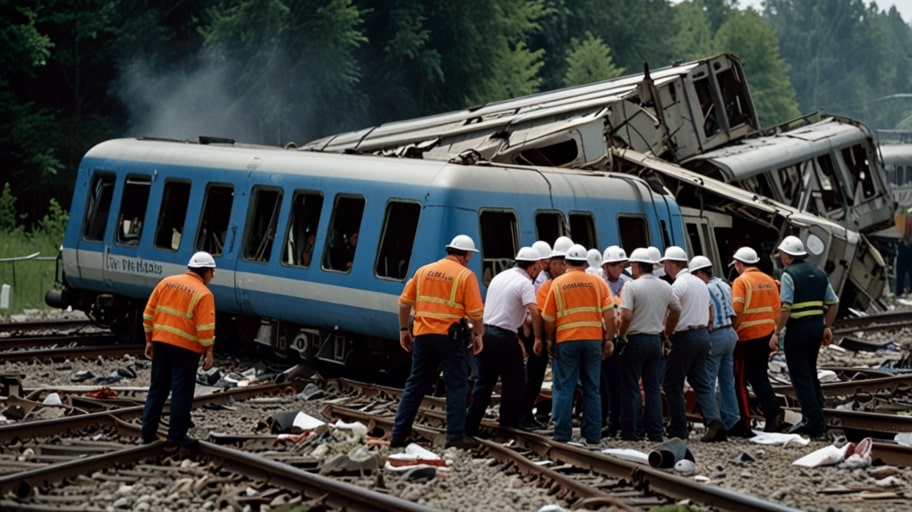
Eight people died and dozens were injured after a high-speed train went off the tracks in the suburbs of Munich today. At 6:45 AM and while going to Munich, the InterCity Express (ICE) train was derailed at Berlin and collided with an embankment nearby. Cops and fire engines arrived in the rushed scene.
Blood on the Rails
The 230 occupants of the train were travelling in a train that flew off the tracks in the small neighborhood of Dachau, a residential suburb. The present people testified about the screech that could only be described as deafening, with the train tilting violently. Five carriages tipped, and the debris was all over the tracks. Wreckage was smouldering, and survivors walked, dazed, out of it.
Its Rescue Efforts in Progress
Paramedics and firefighters worked hard to rescue people stuck in the bus. Hospitals were airlifted using helicopters to receive the highly injured. Local officials reported 47 injuries, 12 of which were serious. The rescue, which officials termed heroic, was still underway in the afternoon, with search crews seeking survivors.
The cause remains Unknown
Researchers are rushing to establish the cause of the train derailment. Initial accounts indicate that there is a possible track breakdown or a mechanical breakdown. Deutsche Bahn, the train’s operator, has shut down services along the route. Experts are analyzing the train’s black box to reveal some hints of the disastrous malfunction.
Accounts by Eyewitnesses Are Dismal
Some people living close to the crash scene describe a nightmare. According to a resident, Anna Schmidt, who lived nearby, it sounded like an explosion. People cried on the train that jerked. Others rushed out, hiding through broken windows, and others more were rolled into the cut-up carriages.
Victims’ Stories Emerge
Local reports include a young couple and an elderly teacher among the people who died. Relatives were waiting apprehensively at the hospital. A memorial with flowers and candles was created at the site, with the community in shock at how life was lost so suddenly.
Business and Travel Interruption
The derailment has grounded rail travel in southern Germany. The Munich station was declared delayed, and some trains were cancelled, leaving thousands of people stranded. Enterprises dependent on rail logistics suffer. Governments have asked passengers to consider other routes as more investigations continue.
Government promises to Act Fast
Chancellor Olaf Scholz has mourned the crash, which he has described as a national tragedy. He vowed to investigate and to put more safety in place. The transport Minister, Volker Wissing, has said that emergency funds will be provided so that an inspection of rail infrastructure throughout the country will be conducted to avoid and prevent such future disasters.
Issues of Environmental Concerns Increase
Fuel leakage in the train has triggered environmental concerns. In one case, cleanup crews are trying to contain spills within a local stream. Environmentalists threaten that the area’s water supply will eventually be affected, and immediate intervention should be undertaken to prevent any permanent degradation to the ecosystem.
Town Rallies on Its Feet
The people of Dachau opened their houses to passengers who were stranded. Temporary shelters were provided in local schools to provide food and blankets. Volunteers gave emergency workers water in the morning sun. The spontaneous efforts of the community members also emerged in the tragedy, and they connected with strangers.
World Reactions flood in
World leaders extended condolence messages, and the French President Emmanuel Macron supported them. The accident has provided a global debate on railway safety. Scholars caution that the age of infrastructure in Europe may continue to cause more accidents, so the whole continent needs to be modernized.
Previous incidents of Rail Tragic History
The rail network, which used to be the model worldwide, has been scrutinized in Germany. A 1998 crash of ICE killed 101 revealing safety flaws. The current derailment brings up once again the discussions of maintenance funding and management. According to critics, tracks have been underfunded to the extent that they are prone to collapse.
Passengers Remember Sickening Incidents
One survivor, aged 29, named Maria Keller, indicated she held onto her seat when the carriage tipped. And all went black, she said, and she thought she might scream. There were still others who talked about rescuing wounded passers-by. The common trauma has left passengers with the uncertainty of life.
Research is not Easy
The crash is complicated to probe because the wreck has had its twists, making the gathering of evidence worse. The tracks might have been weakened by weather conditions and recent heavy rains. Train maintenance records of the so-called disaster are also investigated, and the questions investigators want to answer are: Why did the disaster develop so fast?
A Grief-Stricken Nation
Germany is in shock; the flags were at half-mast in Munich. There will be vigils tonight as people remember the victims. The online world is full of condolence messages as people pour tributes with the hashtag #MunichStrong growing as citizens sympathize with the loss and pray for the recovery of the victims.
What is in Store
The derailment raises serious questions about rail safety. Scholars propose modern monitoring tools to identify and trace problems. On the other hand, passengers require Deutsche Bahn’s openness. With further investigations, Germany is at a critical stage of improving its transportation system.
Details About SEO Optimization
The article targets keywords such as Munich train derailment, Germany rail crash, and ICE train accident to improve its search presence. Its 800-word limitation makes it deep, and short paragraphs make it easy to read. Italicized terms and headings enhance the structure, which is in accordance with Google’s ranking algorithms for news content.

